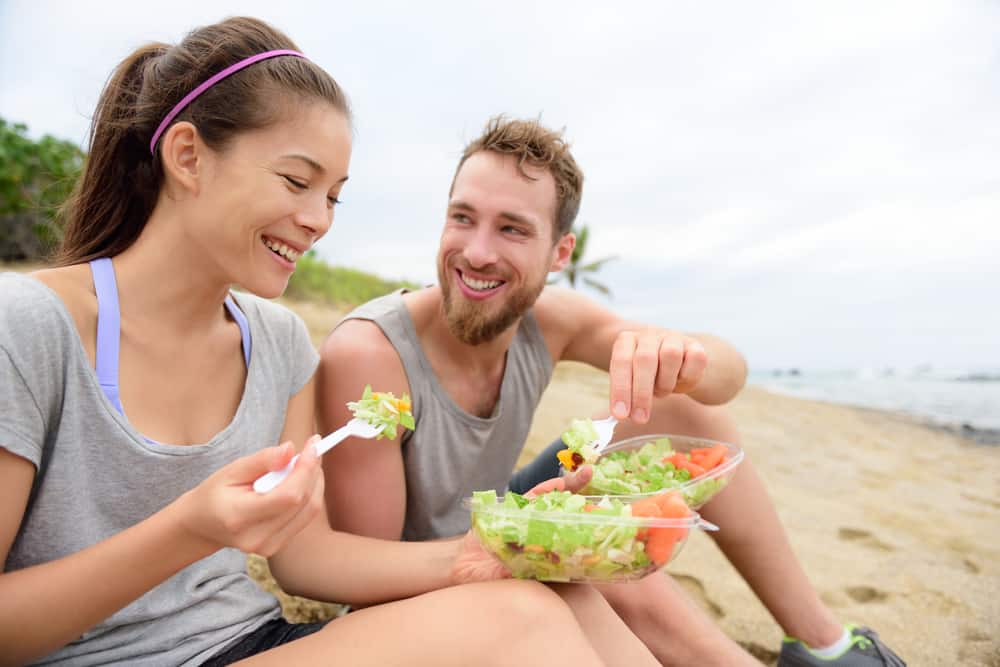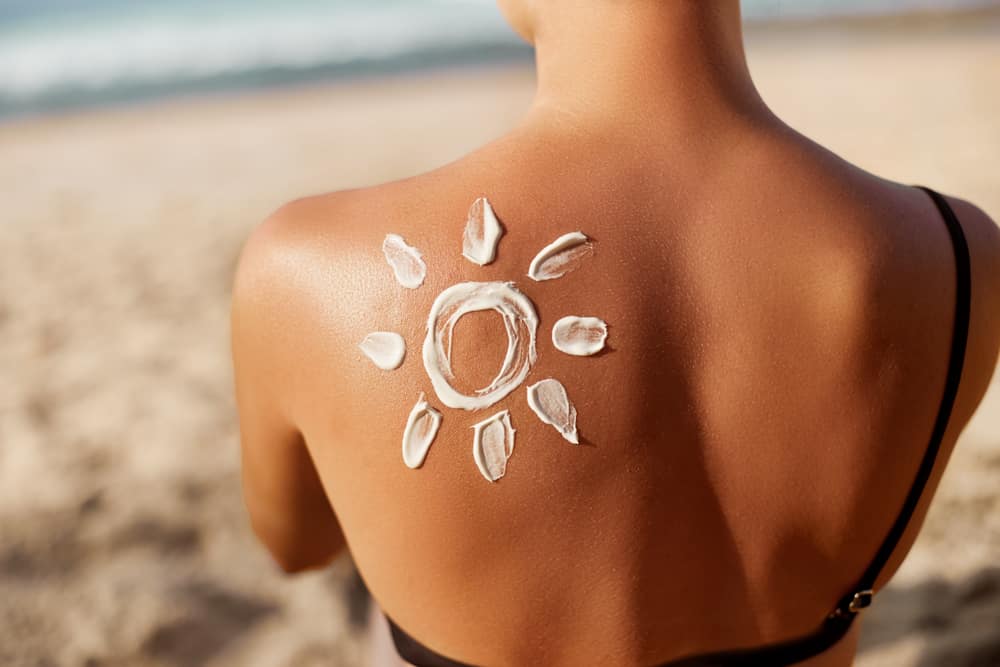Vegans Sunscreen
The Vegan diet boasts an array of incredible health benefits. A completely plant-based diet has been proven to enhance overall vitality and potentially lower the risk of developing many diseases. With the arrival of Summer and a record number of plant-based eaters worldwide, it is worthwhile exploring if vegans need sunscreen? Are they able to forgo this crucial step in their daily skincare routine?
Dermatologists recommend that everyone wear sunscreen – regardless of age, skin tone, gender, and diet. Vegans need to use sunscreen because diet alone will not provide complete protection from the harmful effects of the sun’s UV rays.
The skin is the largest organ of the human body, and it is exposed to harsh environmental factors daily, especially the sun. Let’s explore why vegans need sunscreen and how they can nourish and protect the skin from UV damage with an internal AND external approach.
External Approach
Why Vegans Need Sunscreen
With the continuous depletion of the ozone layer and an increase in cases of skin-related cancers, sidestepping the sunscreen is definitely not an option. While a plant-based diet is proven to promote the skin’s tolerance, repair, and protection from harmful UV rays, it cannot stand alone as a source of sun protection.
Here are a few reasons why vegans should consider using sunscreen:
- Sunscreen essentially defends the skin from UV rays, which are waves of electromagnetic radiation.
- Prevent premature aging, dark spots, wrinkles, and pigmentation
- Reduce overall UV exposure, which reduces the risk of sunburn
- Reduced risk of skin cancer – daily sunscreen application can cut the risk of cancer by half!
- The epidermis is directly exposed to the sun and would therefore require external protection.
- It is very difficult to maintain a ‘healthy’ and optimal sun-protecting diet 24/7. You would need to consume ridiculous amounts of certain foods for the supposed ‘maximum protection.
- Our digestive systems and bodies are all different – certain people may not fully absorb all the nutrients contained in the food. This will inhibit the potential of dietary photoprotection.
- Even our ancestors used additional sun protection by applying mud to the skin. A vanishing ozone layer means that using sunscreen is essential now more than ever.
Vegan Sunscreen
There is an assortment of vegan sunscreens available on the market.
Read the ingredients label carefully. Just because a product is labelled as ‘cruelty-free’, it doesn’t necessarily mean it is free from animal-derived ingredients.
Majority of vegan sunscreens are made with cleaner ingredients that are better for the body AND the environment.
What To Look for When Purchasing a Vegan Sunscreen:
- Reef-safe
- Cruelty-free / Not tested on animals
- All-natural, plant-based ingredients
- Free from animal-derived ingredients (lanolin, elastin, stearic acid, chitin, collagen, and beeswax are the most common)
- The sunscreen should deliver broad-spectrum protection
- An SPF 30 or higher is ideal for the face and to protect moles, scars, tattoos, and beauty spots
- SPF 15 or higher for the rest of the body
Click on the link below to view the PETA-approved sunscreens that are available on the market:
https://www.peta.org/living/personal-care-fashion/top-vegan-cruelty-free-sunscreens/
Other External Approaches To Take
Besides the daily use of sunscreen, the following precautions will add further protection from UV damage:
- Wear protective clothing such as long-sleeved shirts, long pants, hats, and sunglasses. Look out for clothing specially made with sun-protective material.
- Be extra vigilant around reflective surfaces (snow, water, and sand) as they increase the damaging effect of the sun’s rays. The UV rays reflected through a car’s side windows are also harmful.
- Be mindful of your medications and supplements. Certain meds can increase your skin’s sensitivity to the sun. Antibiotics, anti-inflammatories, chemotherapy, blood pressure medication, chlorophyll, and antifungals are common culprits.
- Check the time. The sun’s rays are strongest between 10 am and 3 pm. It is best to limit sun exposure during this period.
- Look up the UV Index for the day. You can find this on a weather app. When the index is 10 or higher, it is strongly recommended to stay indoors.
- Avoid or limit sunbathing. You only begin to develop a tan when the damage has already been done! The damage caused by extended periods of sun exposure will add up over time. It results in a breakdown of collagen, premature aging, and an increased risk of developing skin cancer.
* Take note that tanning beds and lamps are up to three times more harmful than the sun. The UV rays emitted by these machines are extremely strong.
DID YOU KNOW?
Facts released by experts at skincancer.org:
- There is no such thing as a ‘safe tan’.
- Sun beds are not a healthier alternative to the sun.
- One indoor tanning session increases your risk for developing melanoma by 75%

Internal Approach
Edible Sunscreen – Plant-Based Foods For Natural Sun Protection
There is no surprise that a vegan diet tops the charts for its skin-supporting benefits. A plant-based diet will boost the skin’s natural defence against sun damage by providing the following:
- Increased sun tolerance
- DNA protection
- Decreased inflammation
- Prevention and repair of skin
- Increased collagen and elasticity
The Top 10 Vegan Food Sources For Sun Protection
Make sure to get a daily dose of these nutrient-rich foods for enhanced skin protection and healing:
- Tea – Black, green, white, and matcha
- Other beverages – red wine (in moderation) and coffee
- Dark chocolate and raw cacao powder – 70% dark or higher
- Green vegetables – broccoli, brussels sprouts, zucchini, leafy greens
- Orange and yellow vegetables – carrots, squashes, sweet potatoes, patty pans
- Red fruit and vegetables – tomatoes, watermelon, berries, grapefruit, pomegranates, grapes
- Citrus fruits – lemons, limes, oranges, grapefruit, clementines
- Nuts and seeds – especially almonds, Brazil nuts, walnuts, chia seeds, and flax seeds
- Herbs and Spices – turmeric, cayenne pepper, cinnamon, parsley, and rosemary
- Fats and oils – avocado, olive oil, coconut oil, flaxseed oil (in moderation)
It is evident from the list above that a nutritionally balanced and diverse vegan diet will certainly aid in reducing the risk of damage caused to the skin from excessive exposure to UV rays.
Try out these delicious vegan recipes which include the sun-protecting foods listed above:
VEGAN SKIN-LOVING SUPERFOOD SMOOTHIE
Brimming with antioxidants, this refreshing smoothie is the perfect way to start the day.
Serves: 1
Ingredients
- 1 large handful of spinach or kale
- 1 cup frozen blueberries
- 1 medium orange, peeled and sliced
- 1 tablespoon chia seeds (or flax seeds)
- ¼ teaspoon turmeric
- Pinch of black pepper (aids in turmeric absorption)
- 1 tablespoon almond butter
- 1 cup water or plant-based milk of choice
Directions
- Add all of the ingredients to a high-speed blender and process until smooth.
- Pour into a glass and enjoy!
NOURISHING VEGAN SKIN-BOOSTING SALAD
A fast, fresh and flavorful dish! Enjoy as a meal on its own or as a side.
Serves: 2
Ingredients
- 2 large handfuls of baby spinach
- 1 medium avocado, sliced into wedges
- 4 baby zucchinis, sliced into thin ribbons
- 3 medium carrots, sliced into thin ribbons
- ½ cup pomegranate rubies
- ½ cup walnuts, chopped
- 1 cup chopped parsley
- Juice of 1 lime
Directions
- Place all of the ingredients in a large bowl and gently toss to combine.
- Lightly drizzle with extra virgin olive oil and the juice of 1 lime.
- Add salt, pepper, and seasoning to taste.
- Enjoy!
Vegans Shouldn’t Shy Away From The Sun Completely!
Like plants, humans also need the sun to survive.
- Moderate sun exposure enables our body to produce Vitamin D (a vitamin it cannot make on its own). The best source of Vitamin D is from the sun. It is essential for countless bodily processes:
- healthy hormone production
- a strong immune system
- reduced risk of cancer
- healthy bones, teeth, nails, and muscles
- brain and nervous system support
- gut and microbiome support
- Sun exposure helps to set our circadian rhythm (the body’s natural ‘clock’). This signals the body when to produce certain hormones, wake up, and fall asleep.
- Sunlight helps the body produce serotonin, which naturally boosts your mood and lowers the risk for depression and anxiety.
What Is a Healthy Amount OF Sun Exposure?
Aim for 10-15 minutes of unprotected sun exposure on areas such as your legs, arms, abdomen, and back – daily or several times a week.
People with darker skin tones can allow for 15-20 minutes of sun exposure.
Conclusion
While a vegan diet proves to be beneficial for overall skin health and enhanced endurance from sun exposure, it is not fully adequate to offer maximum protection. A balanced approach to sun protection is ideal.
It is highly recommended for vegans to use sunscreen as a preventative measure against potentially life-threatening diseases such as cancer melanoma, DNA damage, premature aging and a suppressed immune system.
Nonetheless, vegans should still embrace the sun in small doses for optimal health.
Sources
https://www.skincancer.org/risk-factors/tanning/
https://www.peta.org/living/personal-care-fashion/top-vegan-cruelty-free-sunscreens/
https://theveganword.com/vegan-sunscreen/
https://ilds.org/our-members/directory/international-society-of-dermatology/
https://www.consumerreports.org/sun-protection/foods-that-fight-sun-damage/
